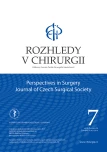-
Medical journals
- Career
Fistuloclysis as a method of nutritional management in a patient with high output enteroatmospheric fistula – a case report
Authors: L. Bébarová 1; M. Stašek 1; M. Szkorupa 1; T. Řezáč 1; P. Skalický 1; M. Horáková 2; K. Dostálová 3; M. Loveček 1
Authors‘ workplace: I. Chirurgická klinika Lékařské fakulty Univerzity Palackého a Fakultní nemocnice Olomouc 1; Oddělení intenzivní péče chirurgických oborů lékařské fakulty Univerzity Palackého a Fakultní nemocnice Olomouc 2; Klinika anesteziologie, resuscitace a intenzivní medicíny lékařské fakulty Univerzity Palackého a Fakultní nemocnice Olomouc 3
Published in: Rozhl. Chir., 2019, roč. 98, č. 7, s. 287-290.
Category: Case Report
Overview
Enteric fistula is a pathological communication between the small intestine and surrounding tissue. In case of communication with body surface it is called an enterocutaneous or enteroatmospheric fistula. There are many causes of enterocutaneous/enteroatmospheric fistula occurrence. A common result is malnutrition and organ dysfunction which leads to increased morbidity and mortality of the patients. Adequate nutritional support is a very important element in the management of patients with enterocutaneous/enteroatmospheric fistulas. One of the options of nutritional support is fistuloclysis which means administration of enteral nutrition formula to the distal fistula. We present the case of 76-year-old patient with a high-localized and high output enteroatmospheric fistula in whom we were able to reach adequate nutritional status using fistuloclysis, followed by closure of the fistula.
Keywords:
fistuloclysis – enteral fistula
Sources
- Kumpf VJ, Aguilar-Nascimento JE, Graf JI D-P, et al. ASPEN-FELANPE clinical guidelines: Nutrition support of adult patients with enterocutaneous fistula. JPEN J Parenter Enteral Nutr. 2017;41 : 104−12. doi: 10.1177/0148607116680792. Epub 2016 Dec 5.
- Badrasawi M, Shahar S, Sagap I. Nutritional management in enterocutaneous fistula. What is the evidence? Malays J Med Sci. 2015;22 : 6−16.
- Polk TM, Schwab CW. Metabolic and nutritional support of the enterocutaneous fistula patient: a three-phase approach. World J Surg. 2012;36 : 524−33. doi: 10.1007/s00268-011-1315-0.
- Wu J, Ren J, Wang G, et al. Fistuloclysis improves liver function and nutritional status in patients with high-output upper enteric fistula. Gastroenterol Res Pract. 2014;2014 : 941514. doi: 10.1155/2014/941514.
- Wright SJ, Daniells S, Keogh GW. Fistuloclysis: a high-calorie, polymeric formula can be successful. JPEN J Parenter Enteral Nutr. 2013;37 : 550−3. doi: 10.1177/0148607112452307. Epub 2012 Jul 2.
- Njeze GE, Achebe UJ. Enterocutaneous fistula: a review of 82 cases. Niger J Clin Pract. 2013;16 : 174−7. doi: 10.4103/1119-3077.110140.
- Galie KL, Whitlow CB. Postoperative enterocutaneous fistula: when to reoperate and how to succeed. Clin Colon Rectal Surg. 2006;19 : 237−46. doi: 10.1055/s-2006-956446.
- Ortiz LA, Zhang B, McCarthy MW. Treatment of enterocutaneous fistulas, then and now. Nutr Clin Pract. 2017;32 : 508−15. doi: 10.1177/0884533617701402.
- Pelák Z, Skála P. Enterální píštěl jako pooperační komplikace – kazuistika. Rozhl Chir. 2009;88 : 334−6.
- Sule EA, Nzegwu MA, Okolo JC, et al. Postoperative enterocutaneous fistula – principles in non-operative approach. Ann Med Surg. (Lond) 2017;24 : 77−81. doi: 10.1016/j.amsu.2017.09.011. eCollection 2017 Dec.
- Bleier JIS, Hedrick T. Metabolic support of the enterocutaneous fistula patient. Clin Colon Rectal Surg. 2010;23 : 142−8. doi: 10.1055/s-0030-1262981.
- Pflug AM, Utiyama EM, Fontes B, et al. Continuous reinfusion of succus entericus associated with fistuloclysis in the management of a complex jejunal fistula on the abdominal wall. Int J Surg Case Rep. 2013;4 : 716−8. doi: 10.1016/j.ijscr.2013.04.041.
- Cawich S, McFarlane M, Mitchell D. Fistuloclysis: a novel approach to the management of enterocutaneous fistulae. The Internet Journal of Surgery 2006;9.
- Farrer K, Lal S, Teubner A. Fistuloclysis and distal enteral feeding in acute intestinal failure. Clin Nutr ESPEN 2015;10:e189. doi: 10.1016/j.clnesp.2015.03.030.
Labels
Surgery Orthopaedics Trauma surgery
Article was published inPerspectives in Surgery

2019 Issue 7-
All articles in this issue
- Klinická výživa v chirurgii a jak dál?
- The most recent recommendations for the surgical treatment of inguinal hernia
- Comparison of efficacy of low-volume bowel cleansers prior to colonoscopy: a randomised, prospective, open-label trial
- Mesh fixation in laparoscopic reconstruction of inguinal hernias
- Fistuloclysis as a method of nutritional management in a patient with high output enteroatmospheric fistula – a case report
- Fournier‘s gangrene as Amyand‘s hernia complication
- Splenic abscess as a rare symptom of the extrapulmonary tuberculosis – case report
- Konference SAGES 2019
- Ohlédnutí za mezinárodním kongresem karcinomu žaludku
- Infraglenoid fracture of the scapular neck − fact or myth?
- Perspectives in Surgery
- Journal archive
- Current issue
- Online only
- About the journal
Most read in this issue- The most recent recommendations for the surgical treatment of inguinal hernia
- Mesh fixation in laparoscopic reconstruction of inguinal hernias
- Fournier‘s gangrene as Amyand‘s hernia complication
- Fistuloclysis as a method of nutritional management in a patient with high output enteroatmospheric fistula – a case report
Login#ADS_BOTTOM_SCRIPTS#Forgotten passwordEnter the email address that you registered with. We will send you instructions on how to set a new password.
- Career

